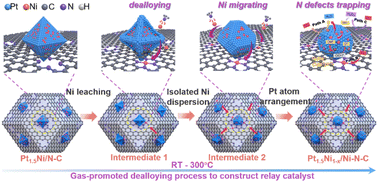A closely packed Pt1.5Ni1−x/Ni–N–C hybrid for relay catalysis towards oxygen reduction†
Abstract
Diminishing the usage of Pt without sacrificing its activity still remains a challenge in proton-exchange membrane fuel cells (PEMFCs). Here, we report a gas-promoted dealloying process to prepare a closely packed hybrid electrocatalyst containing Pt-based alloy nanocrystals (NCs) and dense isolated Ni sites. Driven by ammonia and heat, the initial Pt1.5Ni NC undergoes a dealloying process to form a stable Pt-skin Pt1.5Ni1−x alloy due to the continuous detachment of Ni atoms from it. Subsequently, these Ni atoms would be trapped by the adjacent defects on the carbon substrates, resulting in abundant Ni sites distributed closely around the dealloyed Pt1.5Ni1−x NC. For a multielectron transferred oxygen reduction reaction (ORR), the hybrid ensures the reduction of the two electrons at Ni single sites, and the corresponding intermediate (OOH*) rapidly migrates to the neighboring Pt-based NC to finish the subsequent electron transfer. This efficient relay catalytic process could greatly reduce the usage of Pt. The resulting catalyst exhibits excellent ORR activity with a mass activity (MA) of 4.10 A mgPt−1, exceeding that of commercial Pt/C by a factor of ∼15. More importantly, in practical H2/O2 fuel cell tests, a peak power density of 1.72 W cm−2 and a current density of 0.55 A cm−2 at 0.80 V can be achieved, both of which exceed DOE 2025 targets.



 Please wait while we load your content...
Please wait while we load your content...